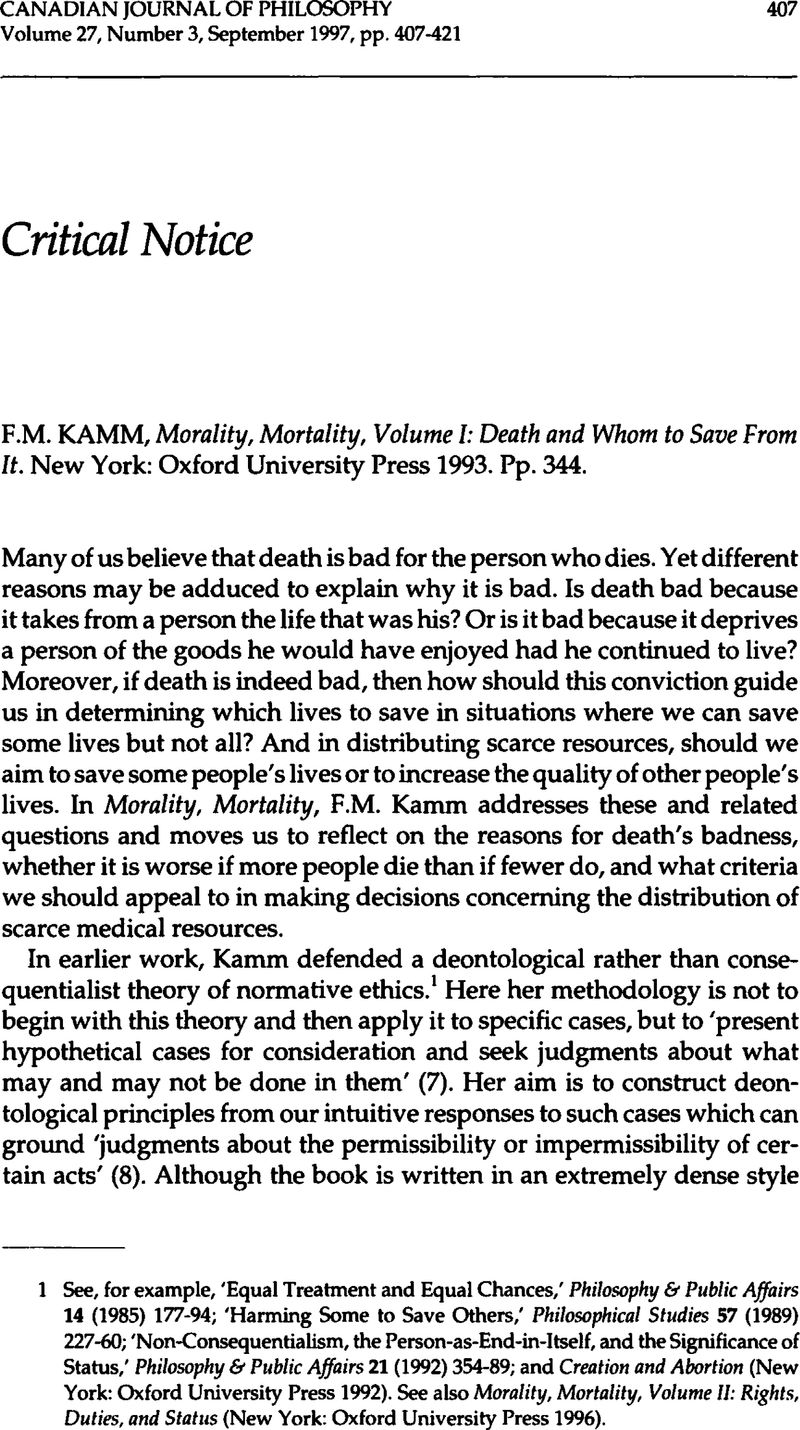No CrossRef data available.
Published online by Cambridge University Press: 01 January 2020

1 See, for example, ‘Equal Treatment and Equal Chances,’ Philosophy & Public Affairs 14 (1985) 177-94; ‘Harming Some to Save Others,’ Philosophical Studies 57 (1989) 227-60; ‘Non-Consequentialism, the Person-as-End-in-Itself, and the Significance of Status,’ Philosophy & Public Affairs 21 (1992) 354-89; and Creation and Abortion (New York: Oxford University Press 1992). See also Morality, Mortality, Volume II: Rights, Duties, and Status (New York: Oxford University Press 1996).
2 In Mortal Questions (Cambridge: Cambridge University Press 1979), 1–10, esp. 4-9.
3 ‘Death is nothing to us, since when we are, death is not, and when death is, we are not’ (Epicurus, Letter to Menoeceus, in Epicurus: The Extant Remains, Cyril Bailey, ed. [Oxford: Clarendon Press 1926],85Google Scholar).
4 Confrontations with the Reaper (New York: Oxford University Press 1992), 139-42. Also, ‘Some Puzzles About the Evil of Death,’ Philosophical Review 100 (1991) 205-27, at 217-18
5 Lucretius, De Rerum Natura, Book III, Kenney, E.J. ed. (Cambridge: Cambridge University Press 1971), II. 861–8Google Scholar.
6 Reasons and Persons (Oxford: Clarendon Press 1984), 176-7
7 Williams, Bernard argues along similar lines regarding immortality in ‘The Makropoulos Case: Reflections on the Tedium of Immortality,’ in Problems of the Self (Cambridge: Cambridge University Press 1973), 82–100CrossRefGoogle Scholar.
8 Tolstoy, Leo The Death of Ivan Ilych, Solotaroff, Lynn ed. (New York: Bantam 1981)Google Scholar
9 Philosophy & Public Affairs 6 (1978) 293-316
10 Parfit, makes a similar point in ‘Innumerate Ethics,’ Philosophy & Public Affairs 7 (1978) 86–101Google Scholar.
11 Kamm spells out five different versions of ‘Sobjectivity,’ the basic concept of which she introduced in her earlier work. These versions involve considerable detail, and I cannot fairly address all of them here. For present purposes, it will suffice to say that the move from the first to the fifth version reflects the increasing weight that aggregated smaller gains and losses to many people have compared with significant gains and losses to one person. Kamm's position is that ‘a significant gain to one person should not be outweighed by aggregated small gains to many people’ (187).
12 US Task Force on Organ Transplantation. Organ Transplantation: Issues and Recommendations (Washington, DC: US Dept. of Health and Human Services, Public Health Service, Health Resources and Services Administration, Office of Organ Transplantation 1986).
13 A Theory of Justice (Cambridge, MA: Harvard Belknap Press 1971), 40ff.
14 ‘Contractualism and Utilitarianism,’ in Utilitarianism and Beyond, Sen, Amartya and Williams, Bernard eds. (Cambridge: Cambridge University Press 1982) 103–28CrossRefGoogle Scholar
15 Who Lives? Who Dies? (New Haven: Yale University Press 1992)
16 Starzl, T.E. et al., ‘A Multifactorial System for Equitable Selection of Cadaver Kidney Recipients,’ Journal of the American Medical Association 257 (1987) 3073–5CrossRefGoogle ScholarPubMed
17 I am grateful to two anonymous referees for the Canadian Journal of Philosophy, whose criticisms and suggestions have led to many improvements in this paper. Work on the paper was supported by a Killam Post-Doctoral Fellowship.